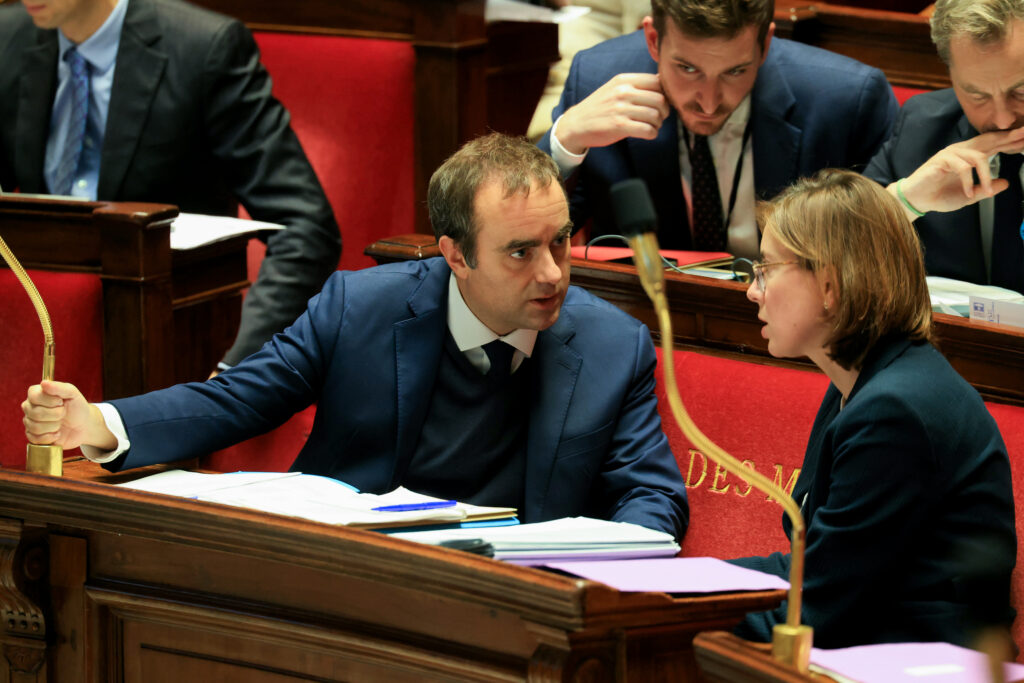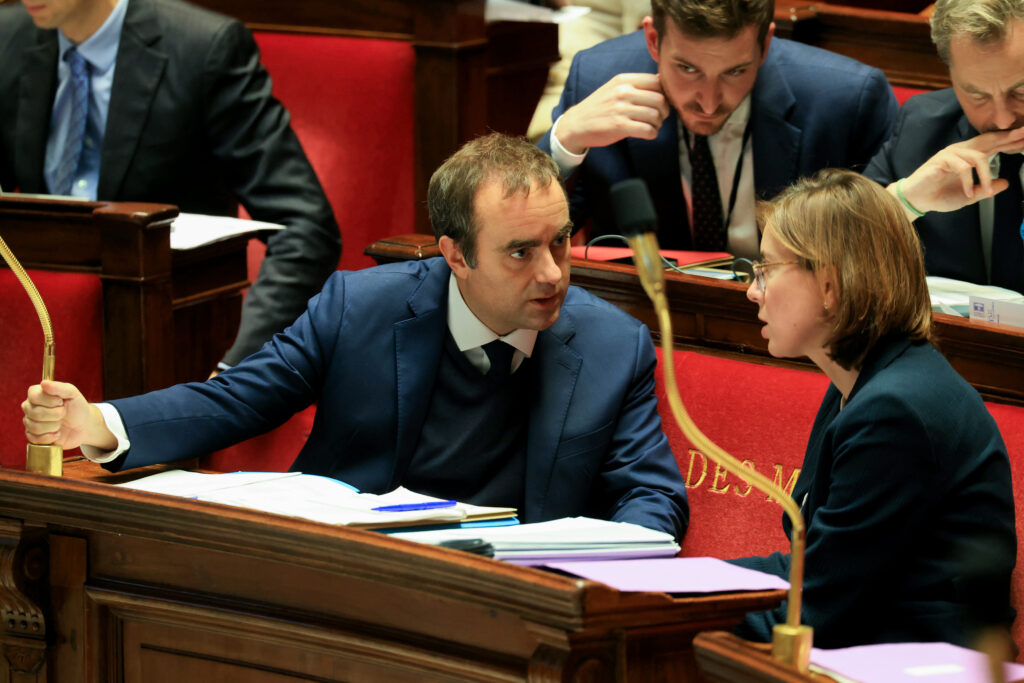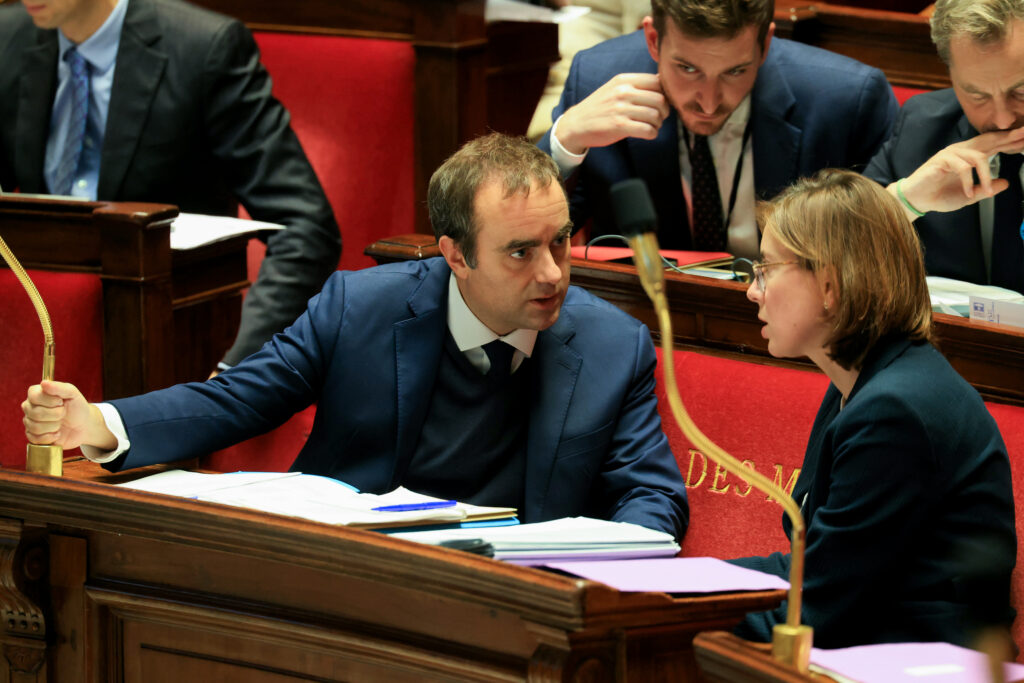Angleterre: Sunderland concède le nul face à Everton (1-1)
Sunderland s’est rapproché de la tête du classement malgré un match nul (1-1) face à Everton lundi en match de clôture de la 10e journée du Championnat d’Angleterre Les Black Cats de l’entraîneur français Régis le Bris, qui avaient l’occasion de se hisser en deuxième position en cas de victoire, grimpent toutefois à la quatrième place (18 pts), ex aequo avec Liverpool et Bournemouth, avant de recevoir Arsenal, le leader, samedi.Everton, qui remonte d’une place (14e avec 12 pts), restait sur des défaites contre Manchester City et Tottenham sans marquer, et ne compte qu’une seule victoire dans les sept derniers matches de Premier League.Iliman Ndiaye a ouvert le score au quart d’heure de jeu pour Everton en se jouant de quatre défenseurs avant de loger la balle du gauche dans le petit filet.A la demi-heure, l’attaquant français Thierno Barry a eu la balle du 2-0 mais sa frappe de près, sur un centre de Jack Grealish très actif sur son côté gauche, est partie trop haut.Sunderland a égalisé dès le retour des vestiaires sur une frappe à la limite de la surface de Granit Xhaka déviée par un défenseur (46e). Deux minute plus tard, il fallait un réflexe du portier d’Everton Jordan Pickford, qui affrontait pour la première fois son club formateur depuis son départ en 2017, pour sortir un nouveau nouveau tir dévié. Dans le temps additionnel, le jeune Argentin Carlos “Charly” Alcaraz a eu la balle du KO pour l’autre club de la Mersey au bout d’un contre mais a très mal négocié son dernier dribble.Petite consolation, Sunderland reste invaincu au Stadium of Light cette saison (3 victoires, 2 nuls).
Budget: les débats s’étirent en longueur, le projet de financement de la Sécu en approche
Les députés bouclent lundi huit jours de débats sur la partie “recettes” du budget de l’État et voient peu à peu s’éloigner l’espoir d’arriver un jour au vote sur ce texte, remplacé dès mardi dans l’hémicycle par l’examen du budget de la Sécurité sociale. Au fil des heures de discussion, le constat est chaque jour plus clair: l’Assemblée risque de ne pas pouvoir examiner en entier la première partie du projet de loi de finances avant le 23 novembre à minuit, date à laquelle le gouvernement doit transmettre le texte au Sénat. S’il existe une chance que les débats s’accélèrent, le gouvernement semble désormais envisager clairement l’hypothèse du dépassement des délais. La ministre des Comptes publics Amélie de Montchalin a ainsi assuré lundi soir que le gouvernement s’engageait à “transmettre” au Sénat “tous les amendements” qui auront été “votés” par l’Assemblée nationale. Une manière d’assurer aux groupes parlementaires que leurs travaux ne seront pas vains. En effet, lorsque les délais constitutionnels sont dépassés, l’exécutif est en droit de transmettre le projet initial, balayant du coup tous les votes des députés d’un claquement de doigts. En faisant le choix inverse, Sébastien Lecornu va donc demander au Sénat de se positionner sur toutes les mesures adoptées par les députés.Cette annonce intervient après huit jours d’âpres débats. Un examen qui s’est poursuivi lundi avec notamment l’adoption d’un amendement RN rétablissement “l’exit tax” (taxe d’expatriation) dans sa version d’origine sarkozyste. Ou encore le resserrement du pacte Dutreil qui facilite la transmission d’une entreprise familiale. Dans la soirée, les députés ont rejeté l’une des mesures les plus décriées du projet de budget de l’Etat qui prévoit de soumettre à l’impôt sur le revenu les indemnités journalières versées aux personnes atteintes d’une affection longue durée (ALD).- Rendez-vous le 12 novembre -L’examen du projet de loi de finances pour 2026 ne reprendra que le 12 novembre, car les députés entament dès mardi la discussion sur le projet de financement de la Sécurité sociale, truffé d’irritants lui aussi.Amélie de Montchalin a profité de ce premier moment-charnière pour tirer un premier bilan des votes: on est loin “du budget Frankenstein” que la confusion fiscale des derniers jours pourrait laisser croire, selon elle. “Nous sommes précisément à 4,7% (du PIB) de déficit”, soit l’objectif initial du gouvernement, a-t-elle indiqué lundi matin. “Ce qui veut dire qu’il y a encore de la marge de manœuvre” lors de la navette parlementaire.Côté entreprises, “il y a eu des hausses d’impôts de 2,5 milliards pour les multinationales. Il y a eu des baisses aussi à peu près de 3 milliards de moins pour les PME”, a-t-elle résumé.Ce calcul exclut cependant “quatre taxes” (sur les multinationales, les rachats d’actions, les super dividendes notamment) que le gouvernement juge inapplicables ou contraires au droit européen.Côté ménages, il y aurait “à peu près 2 milliards de moins d’impôt, notamment du fait du dégel du barème de l’impôt sur le revenu” et de l’autre “un ensemble de mesures sur les plus fortunés qui représenteraient plus que l’ISF avant 2017″. Ces mesures devraient rapporter entre 5 et 6 milliards d’euros, contre 5,1 pour l’ISF.Insuffisant toutefois pour que cette copie réunisse une majorité de députés, du moins à ce stade, car les divergences restent grandes.”Je ne vois pas très bien comment cette partie 1 pourrait être votée, parce qu’en fait elle ne va satisfaire personne”, a pointé le rapporteur général du Budget, Philippe Juvin (LR).- La gauche boycotte une réunion -Reconnaissant ces limites dans la discussion budgétaire pour parvenir à une copie d’ensemble cohérente, le Premier ministre a demandé à ses ministres de réunir les représentants des groupes pour trouver des points d’accord. Las. La gauche ne s’est pas rendue à la réunion organisée à la mi-journée au ministère des Relations avec le Parlement, en raison de la présence du Rassemblement national. Outre le RN, son allié l’UDR d’Eric Ciotti, le groupe indépendant Liot et les représentants du socle commun y ont assisté. Le premier secrétaire du PS Olivier Faure continue de son côté à tenir un discours optimiste: si la voie était “étroite” vers une adoption, un “chemin” lui semblait encore “possible” lundi.”J’appelle ça les idiots utiles du macronisme”, a rétorqué l’Insoumis Eric Coquerel devant la presse.En cas de rejet de cette première partie, le projet de budget partirait au Sénat dans sa version initiale. Si le Parlement ne s’est pas prononcé le 23 décembre, le gouvernement peut légiférer par ordonnances, une procédure inédite. Autre option, en cas de rejet du budget: le vote d’une loi spéciale.
Budget: les débats s’étirent en longueur, le projet de financement de la Sécu en approche
Les députés bouclent lundi huit jours de débats sur la partie “recettes” du budget de l’État et voient peu à peu s’éloigner l’espoir d’arriver un jour au vote sur ce texte, remplacé dès mardi dans l’hémicycle par l’examen du budget de la Sécurité sociale. Au fil des heures de discussion, le constat est chaque jour plus clair: l’Assemblée risque de ne pas pouvoir examiner en entier la première partie du projet de loi de finances avant le 23 novembre à minuit, date à laquelle le gouvernement doit transmettre le texte au Sénat. S’il existe une chance que les débats s’accélèrent, le gouvernement semble désormais envisager clairement l’hypothèse du dépassement des délais. La ministre des Comptes publics Amélie de Montchalin a ainsi assuré lundi soir que le gouvernement s’engageait à “transmettre” au Sénat “tous les amendements” qui auront été “votés” par l’Assemblée nationale. Une manière d’assurer aux groupes parlementaires que leurs travaux ne seront pas vains. En effet, lorsque les délais constitutionnels sont dépassés, l’exécutif est en droit de transmettre le projet initial, balayant du coup tous les votes des députés d’un claquement de doigts. En faisant le choix inverse, Sébastien Lecornu va donc demander au Sénat de se positionner sur toutes les mesures adoptées par les députés.Cette annonce intervient après huit jours d’âpres débats. Un examen qui s’est poursuivi lundi avec notamment l’adoption d’un amendement RN rétablissement “l’exit tax” (taxe d’expatriation) dans sa version d’origine sarkozyste. Ou encore le resserrement du pacte Dutreil qui facilite la transmission d’une entreprise familiale. Dans la soirée, les députés ont rejeté l’une des mesures les plus décriées du projet de budget de l’Etat qui prévoit de soumettre à l’impôt sur le revenu les indemnités journalières versées aux personnes atteintes d’une affection longue durée (ALD).- Rendez-vous le 12 novembre -L’examen du projet de loi de finances pour 2026 ne reprendra que le 12 novembre, car les députés entament dès mardi la discussion sur le projet de financement de la Sécurité sociale, truffé d’irritants lui aussi.Amélie de Montchalin a profité de ce premier moment-charnière pour tirer un premier bilan des votes: on est loin “du budget Frankenstein” que la confusion fiscale des derniers jours pourrait laisser croire, selon elle. “Nous sommes précisément à 4,7% (du PIB) de déficit”, soit l’objectif initial du gouvernement, a-t-elle indiqué lundi matin. “Ce qui veut dire qu’il y a encore de la marge de manœuvre” lors de la navette parlementaire.Côté entreprises, “il y a eu des hausses d’impôts de 2,5 milliards pour les multinationales. Il y a eu des baisses aussi à peu près de 3 milliards de moins pour les PME”, a-t-elle résumé.Ce calcul exclut cependant “quatre taxes” (sur les multinationales, les rachats d’actions, les super dividendes notamment) que le gouvernement juge inapplicables ou contraires au droit européen.Côté ménages, il y aurait “à peu près 2 milliards de moins d’impôt, notamment du fait du dégel du barème de l’impôt sur le revenu” et de l’autre “un ensemble de mesures sur les plus fortunés qui représenteraient plus que l’ISF avant 2017″. Ces mesures devraient rapporter entre 5 et 6 milliards d’euros, contre 5,1 pour l’ISF.Insuffisant toutefois pour que cette copie réunisse une majorité de députés, du moins à ce stade, car les divergences restent grandes.”Je ne vois pas très bien comment cette partie 1 pourrait être votée, parce qu’en fait elle ne va satisfaire personne”, a pointé le rapporteur général du Budget, Philippe Juvin (LR).- La gauche boycotte une réunion -Reconnaissant ces limites dans la discussion budgétaire pour parvenir à une copie d’ensemble cohérente, le Premier ministre a demandé à ses ministres de réunir les représentants des groupes pour trouver des points d’accord. Las. La gauche ne s’est pas rendue à la réunion organisée à la mi-journée au ministère des Relations avec le Parlement, en raison de la présence du Rassemblement national. Outre le RN, son allié l’UDR d’Eric Ciotti, le groupe indépendant Liot et les représentants du socle commun y ont assisté. Le premier secrétaire du PS Olivier Faure continue de son côté à tenir un discours optimiste: si la voie était “étroite” vers une adoption, un “chemin” lui semblait encore “possible” lundi.”J’appelle ça les idiots utiles du macronisme”, a rétorqué l’Insoumis Eric Coquerel devant la presse.En cas de rejet de cette première partie, le projet de budget partirait au Sénat dans sa version initiale. Si le Parlement ne s’est pas prononcé le 23 décembre, le gouvernement peut légiférer par ordonnances, une procédure inédite. Autre option, en cas de rejet du budget: le vote d’une loi spéciale.
Budget: les débats s’étirent en longueur, le projet de financement de la Sécu en approche
Les députés bouclent lundi huit jours de débats sur la partie “recettes” du budget de l’État et voient peu à peu s’éloigner l’espoir d’arriver un jour au vote sur ce texte, remplacé dès mardi dans l’hémicycle par l’examen du budget de la Sécurité sociale. Au fil des heures de discussion, le constat est chaque jour plus clair: l’Assemblée risque de ne pas pouvoir examiner en entier la première partie du projet de loi de finances avant le 23 novembre à minuit, date à laquelle le gouvernement doit transmettre le texte au Sénat. S’il existe une chance que les débats s’accélèrent, le gouvernement semble désormais envisager clairement l’hypothèse du dépassement des délais. La ministre des Comptes publics Amélie de Montchalin a ainsi assuré lundi soir que le gouvernement s’engageait à “transmettre” au Sénat “tous les amendements” qui auront été “votés” par l’Assemblée nationale. Une manière d’assurer aux groupes parlementaires que leurs travaux ne seront pas vains. En effet, lorsque les délais constitutionnels sont dépassés, l’exécutif est en droit de transmettre le projet initial, balayant du coup tous les votes des députés d’un claquement de doigts. En faisant le choix inverse, Sébastien Lecornu va donc demander au Sénat de se positionner sur toutes les mesures adoptées par les députés.Cette annonce intervient après huit jours d’âpres débats. Un examen qui s’est poursuivi lundi avec notamment l’adoption d’un amendement RN rétablissement “l’exit tax” (taxe d’expatriation) dans sa version d’origine sarkozyste. Ou encore le resserrement du pacte Dutreil qui facilite la transmission d’une entreprise familiale. Dans la soirée, les députés ont rejeté l’une des mesures les plus décriées du projet de budget de l’Etat qui prévoit de soumettre à l’impôt sur le revenu les indemnités journalières versées aux personnes atteintes d’une affection longue durée (ALD).- Rendez-vous le 12 novembre -L’examen du projet de loi de finances pour 2026 ne reprendra que le 12 novembre, car les députés entament dès mardi la discussion sur le projet de financement de la Sécurité sociale, truffé d’irritants lui aussi.Amélie de Montchalin a profité de ce premier moment-charnière pour tirer un premier bilan des votes: on est loin “du budget Frankenstein” que la confusion fiscale des derniers jours pourrait laisser croire, selon elle. “Nous sommes précisément à 4,7% (du PIB) de déficit”, soit l’objectif initial du gouvernement, a-t-elle indiqué lundi matin. “Ce qui veut dire qu’il y a encore de la marge de manœuvre” lors de la navette parlementaire.Côté entreprises, “il y a eu des hausses d’impôts de 2,5 milliards pour les multinationales. Il y a eu des baisses aussi à peu près de 3 milliards de moins pour les PME”, a-t-elle résumé.Ce calcul exclut cependant “quatre taxes” (sur les multinationales, les rachats d’actions, les super dividendes notamment) que le gouvernement juge inapplicables ou contraires au droit européen.Côté ménages, il y aurait “à peu près 2 milliards de moins d’impôt, notamment du fait du dégel du barème de l’impôt sur le revenu” et de l’autre “un ensemble de mesures sur les plus fortunés qui représenteraient plus que l’ISF avant 2017″. Ces mesures devraient rapporter entre 5 et 6 milliards d’euros, contre 5,1 pour l’ISF.Insuffisant toutefois pour que cette copie réunisse une majorité de députés, du moins à ce stade, car les divergences restent grandes.”Je ne vois pas très bien comment cette partie 1 pourrait être votée, parce qu’en fait elle ne va satisfaire personne”, a pointé le rapporteur général du Budget, Philippe Juvin (LR).- La gauche boycotte une réunion -Reconnaissant ces limites dans la discussion budgétaire pour parvenir à une copie d’ensemble cohérente, le Premier ministre a demandé à ses ministres de réunir les représentants des groupes pour trouver des points d’accord. Las. La gauche ne s’est pas rendue à la réunion organisée à la mi-journée au ministère des Relations avec le Parlement, en raison de la présence du Rassemblement national. Outre le RN, son allié l’UDR d’Eric Ciotti, le groupe indépendant Liot et les représentants du socle commun y ont assisté. Le premier secrétaire du PS Olivier Faure continue de son côté à tenir un discours optimiste: si la voie était “étroite” vers une adoption, un “chemin” lui semblait encore “possible” lundi.”J’appelle ça les idiots utiles du macronisme”, a rétorqué l’Insoumis Eric Coquerel devant la presse.En cas de rejet de cette première partie, le projet de budget partirait au Sénat dans sa version initiale. Si le Parlement ne s’est pas prononcé le 23 décembre, le gouvernement peut légiférer par ordonnances, une procédure inédite. Autre option, en cas de rejet du budget: le vote d’une loi spéciale.
Trial opens in 1st US civil case on 2019 Boeing MAX crashMon, 03 Nov 2025 21:39:01 GMT
Relatives of victims in the fatal crash of a Boeing 737 MAX plane operated by Ethiopian Airlines headed to court Monday for the first civil trial relating to the 2019 calamity.The US aviation giant had come close to facing a jury on previous occasions in US District Judge Jorge Alonso’s Chicago courtroom where the cases …
Trial opens in 1st US civil case on 2019 Boeing MAX crashMon, 03 Nov 2025 21:39:01 GMT Read More »
Mixed day for global stocks as market digests latest AI deals
Global stock markets were mixed Monday with the Nasdaq rising and the Dow retreating as traders digested major AI deals boosting the tech sector.Trading on the first business day in November began on the front foot after an upbeat end to October that saw an easing in China-US tensions, a cut to US interest rates and healthy earnings from market darlings including technology giant Amazon. “Tech and AI remain a huge theme for investors as we move into the final months of the year,” said Kathleen Brooks, research director at trading group XTB.However, early gains in London and Paris faded while US indices had a mixed day.Data showed economic activity in the US manufacturing sector contracted at a faster rate in October, when analysts had been expecting it to stabilize or even expand.Nevertheless the tech-heavy Nasdaq Composite still pushed 0.5 percent higher thanks to blockbuster tech deals.Shares in Amazon jumped 4.0 percent after ChatGPT-maker OpenAI signed a $38 billion deal with Amazon’s AWS cloud computing arm.The deal will give OpenAI, which is partly owned by AWS’s arch-rival Microsoft, access to computing resources including hundreds of thousands of state-of-the-art Nvidia GPU chips, the crucial component of the generative artificial intelligence revolution.Microsoft announced $15.2 billion in investments in artificial intelligence and cloud computing in the United Arab Emirates.The deal sent Nvidia shares up 2.2 percent on hopes it could see access for its most advanced chips expand to more markets as the Trump administration allowed the supply of GPU chips to the UAE.Shares in Nvidia are up over 50 percent since the start of the year.Shares in Microsoft slipped 0.2 percent.”A degree of tiredness is creeping into Wall Street’s mood despite the strong performance thus far in earnings season,” and blockbuster AI deals, said Chris Beauchamp, chief market analyst at investing and trading platform IG.In Europe, Frankfurt managed to end the day in the green, with sentiment boosted by the government’s intention to push forward next year with subsidized electricity for heavy industry.Shares in European carmakers raced higher after China said on Saturday it would exempt some Nexperia chips from an export ban that was imposed over a row with Dutch authorities.Anxiety over chip shortages began when the Netherlands invoked a Cold War-era law in late September to effectively take control of Nexperia, whose parent company Wingtech is backed by the Chinese government.Shares in German automaker Volkswagen gained two percent, while rival Mercedes-Benz rose 1.8 percent.Shares in global automaker Stellantis, which has European brands Peugeot, Fiat and Citroen in its stable, rose by 0.6 percent in Paris.Shares in Ryanair climbed 4.7 percent after the no-frills airline announced a 20-percent gain in quarterly profit on the back of increased ticket prices.Kenvue surged 12.3 percent after the Tylenol-maker reached a $48.7 billion deal to be acquired by US consumer goods giant Kimberly-Clark. Kimberly-Clark fell 14.6 percent.In Asia, Seoul piled on 2.8 percent, reaching a fresh record high, as investors cheered a thawing of ties between South Korea and China.Tokyo was closed for a holiday.- Key figures at around 2120 GMT -New York – Dow: DOWN 0.5 percent at 47,336.68 (close)New York – S&P 500: UP 0.2 percent at 6,851.97 (close)New York – Nasdaq Composite: UP 0.5 percent at 23,834.72 (close)London – FTSE 100: DOWN 0.2 percent at 9,701.37 (close)Paris – CAC 40: DOWN 0.1 percent at 8,109.79 (close)Frankfurt – DAX: UP 0.7 percent at 24,132.41 (close)Hong Kong – Hang Seng Index: UP 1.0 percent at 26,158.36 (close)Shanghai – Composite: UP 0.6 percent at 3,976.52 (close)Tokyo – Nikkei 225: Closed for a holidayEuro/dollar: DOWN at $1.1518 from $1.1537 on FridayPound/dollar: DOWN at $1.3138 from $1.3152Dollar/yen: UP at 154.20 yen from 153.99 yenEuro/pound: DOWN at 87.67 pence from 87.72 penceBrent North Sea Crude: UP 0.2 percent at $64.89 per barrelWest Texas Intermediate: UP 0.1 percent at $61.05 per barrelburs-jmb/dw
Quand les dessinateurs de BD aident les jeux vidéo à sortir de leur bulle
Présenté au public de la Paris Games Week, “Cairn”, poétique jeu vidéo d’escalade du studio français The Game Bakers, bénéficie du trait singulier de l’auteur de BD Mathieu Bablet, insufflant au titre une identité visuelle forte pour le démarquer d’une offre toujours plus pléthorique.Prévu début 2026 sur PC et PS5, “Cairn” place le joueur face à une immense montagne virtuelle à gravir.Chaque parcours doit être préparé avec soin, à la manière d’un vrai grimpeur, tout en gérant la fatigue de l’héroïne, Aava.Développé depuis 2021 par une équipe d’environ 20 personnes, le jeu a nécessité près de trois ans de recherches pour retranscrire de façon réaliste l’escalade en haute montagne, a expliqué à l’AFP Emeric Thoa, cofondateur du studio, lors d’une démonstration à la Paris Game Week.Sur son stand, plusieurs bornes permettent de tester le jeu, sous un mur d’escalade de sept mètres érigé pour l’occasion.Manette en main, le joueur contrôle chaque membre de l’alpiniste au cours d’une ascension lente et méticuleuse, ponctuée de contre-plongées vertigineuses et de cimes enneigées au rendu crayonné.Pour donner vie au mont Kami, The Game Bakers s’est tourné vers le dessinateur grenoblois Mathieu Bablet, auteur de “Carbone & Silicium” et “Shangri-La” (220.000 et 188.000 exemplaires vendus).- “Peinture numérique” -“On voulait quelqu’un qui soit hyper fort pour dessiner les grands espaces”, se souvient Audrey Leprince, directrice du studio indépendant fondé en 2010 par d’anciens d’Ubisoft.The Game Bakers compte deux jolis succès: “Furi” (2016) et “Haven” (2020). Il a consacré environ 5 millions d’euros à “Cairn”.Fan de jeux vidéo, Bablet s’est lui-même inspiré de titres marquants comme “Death Stranding” ou “Shadow of the Colossus” dans ses ouvrages.Mais imaginer l’histoire de “Cairn” a été “un vrai challenge” très éloigné du travail solitaire et en deux dimensions de la BD, reconnaît l’auteur de 38 ans.”J’ai travaillé avec des artistes 3D qui retranscrivaient mon style dans le jeu”, explique-t-il, rapprochant le résultat final d’une “peinture numérique”.”Les dessinateurs de BD sont balaises”, confirme Emeric Thoa, qui souligne leur capacité à créer des univers.Le studio montpelliérain n’est pas le premier à faire appel à un dessinateur de renom.Dès la fin des années 90, des auteurs de BD ont franchi le pas vers le jeu vidéo.À cet égard, le jeu d’aventure “L’Amerzone” du Belge Benoît Sokal, sorti en 1999 et réédité cette année par le français Microids, fait figure de pionnier.D’autres ont suivi, comme Aleksi Briclot, dessinateur de comics Marvel (“Spawn”) et cofondateur du studio français DON’T NOD en 2008.- “Beau pour toujours” -“De plus en plus d’auteurs de BD sont sollicités”, constate Bablet, qui voit “un véritable enjeu” pour les studios à se distinguer “par leur style”.Faire ressortir son jeu au milieu des dizaines de titres publiés chaque jour sur la plateforme de ventes PC Steam, “c’est fondamental”, juge l’auteur.C’est en illustrant la couverture du petit jeu britannique “Overwhelm” que le dessinateur rennais Guillaume Singelin, auteur de “Frontier” (70.000 exemplaires vendus), a fait ses premiers pas dans cette industrie en 2018.Depuis, il a notamment travaillé sur les deux opus de “Citizen Sleeper”, développés par une petite équipe britannique.Cette collaboration lui a permis de toucher de nouveaux lecteurs. “Steam, c’est mondial”, souligne-t-il, alors qu’en BD, “c’est très compliqué de s’exporter”.Les revenus générés ont aussi été “bien plus intéressants pour moi que la BD ces dernières années”, poursuit-il.Face à la course au photoréalisme des dernières décennies, le rendu BD constitue surtout “un moyen de rester beau pour toujours”, veut croire Emeric Thoa.Et peut-être garantir à “Cairn” une place au sommet des jeux.
Le prince William entame à Rio une visite au Brésil tournée vers l’environnement
Pain de sucre, foot au Maracana avec Cafu: le prince William a entamé lundi à Rio de Janeiro une visite au Brésil, où il participera aussi au sommet des dirigeants de la COP30, à Belem.Cette première visite de l’héritier du trône d’Angleterre dans le pays sud-américain intervient tandis que Rio de Janeiro est encore sous le choc d’une opération policière ayant visé des narcotrafiquants, qui a fait 121 morts dans des favelas la semaine dernière.Lundi matin, le prince a d’abord emprunté le téléphérique pour monter jusqu’au Pain de sucre, un des principaux sites touristiques de Rio, sur lequel il a reçu les clés de la ville du maire Eduardo Paes. “Je suis encore le roi de Rio mais il est le bienvenu ici pour partager ce trône avec moi ces jours-ci”, a plaisanté l’édile face aux journalistes.M. Paes a déclaré que le prince était “émerveillé par la beauté de la ville” et avait discuté de ses paysages spectaculaires, de ses plages et de ses favelas, des quartiers pauvres installés au flanc de collines boisées qui plongent dans l’océan.”Nous avons parlé de politique. Nous avons parlé du paysage de Rio, il a posé beaucoup de questions sur les favelas, le contraste entre les favelas et les zones plus aisées”, a-t-il ajouté.”J’ai essayé de lui expliquer les problèmes de sécurité de la ville. Évidemment, c’est complexe, on ne peut pas l’expliquer en cinq minutes. Mais c’était une bonne occasion d’en parler”, a poursuivi le maire. – Pénalty transformé -Dans l’après-midi, le prince William s’est rendu au mythique stade Maracana, où il a a reçu un maillot de l’équipe nationale du Brésil des mains de Cafu, capitaine de la Seleçao championne du monde en 2002.”Il y a beaucoup d’étoiles ici”, a-t-il déclaré, montrant les cinq étoiles au-dessus de l’écusson, symbolisant les cinq titres mondiaux du Brésil, contre un seul pour l’Angleterre.Le prince n’a pas chaussé les crampons, mais a tout de même disputé une brève partie de foot avec Cafu et des enfants. Il a tiré (et transformé) un pénalty.Sa visite sera marquée mercredi à Rio par la cinquième édition de la cérémonie Earthshot Prize, qu’il organise chaque année.Cinq projets environnementaux présentés comme novateurs vont recevoir un million de livres (environ 1,15 million d’euros).De nombreuses vedettes vont défiler sur le “tapis vert” avant la cérémonie, comme la popstar brésilienne Anitta et les stars anglo-saxonnes Kylie Minogue et Shawn Mendes.Le prince William se rendra ensuite dans la ville de Belem, en Amazonie brésilienne, où il prononcera un discours au nom du gouvernement britannique et de son père, le roi Charles, à l’occasion du sommet des dirigeants de la COP30, prévu jeudi et vendredi.
Brésil: plus forte baisse des émissions de gaz à effet de serre en 15 ans
Le Brésil a enregistré en 2024 sa plus forte réduction des émissions de gaz à effet de serre d’une année sur l’autre depuis 2009, en raison notamment de la baisse de la déforestation, selon des données publiées lundi, à quelques jours du début de la COP30.Les émissions brutes dans le plus grand pays d’Amérique latine ont été réduites de 16,7% l’an dernier par rapport à 2023, selon les calculs du réseau brésilien d’ONG Observatoire du climat.Ces chiffres sont une bonne nouvelle pour le gouvernement du président de gauche Luiz Inacio Lula da Silva, qui accueille à partir du 10 novembre la conférence de l’ONU sur le climat, la COP30, dans la ville amazonienne de Belem.”Les nouvelles données montrent l’impact du fait que le gouvernement s’est remis à contrôler la déforestation”, qui était “délibérément hors de contrôle” sous le mandat du prédécesseur de Lula, Jair Bolsonaro (2019-2022), a affirmé ce réseau dans un communiqué.Durant le mandat de l’ex-président d’extrême droite, la déforestation a fortement augmenté, notamment en Amazonie, où la végétation luxuriante joue un rôle essentiel dans l’absorption de gaz à effet de serre.Le déboisement dans la plus grande forêt tropicale de la planète a chuté continuellement depuis le retour au pouvoir de Lula pour un troisième mandat en 2023, après un premier passage à la présidence de 2003 à 2010.Il a baissé de 11% en un an sur la période de référence allant d’août 2024 à juillet 2025, selon les chiffres officiels rendus publics la semaine dernière.Malgré les données encourageantes de l’an dernier, “les données de l’économie brésilienne en 2025 (…) ne permettent pas de faire des projections optimistes” quant au respect des engagements pris par le Brésil pour réduire ses émissions cette année, a tempéré l’Observatoire du climat.Il critique par ailleurs le fait que Lula soutienne un vaste projet d’exploration pétrolière au large de l’Amazonie, alors que l’énergie fossile est la principale source d’émissions de gaz à effet de serre dans le monde.Le forage de la compagnie publique Petrobras a débuté en octobre, après le feu vert de l’agence environnementale publique Ibama.Face aux détracteurs, Lula argumente que l’argent du pétrole peut servir à financer la transition énergétique.







